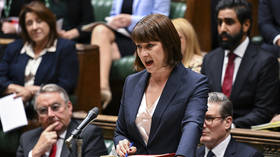British military R&D facing 20% cut – Telegraph

The British government intends to cut funding for military research and development by around 20% this financial year, The Telegraph reported on Tuesday, citing anonymous civil servants. The Ministry of Defence has disputed the claims.
The intended reduction in spending would reportedly be part of a wider budgetary adjustment, including in the ministry, which the new Labour government says is necessary after their Conservative predecessors left a £22 billion ($28bn) hole in the national finances. This year alone, government departments need to save £5.5 billion ($7bn), Chancellor of the Exchequer Rachel Reeves has told MPs.
A ministry spokesman has disputed the report, telling the media: “These claims are incorrect”. The statement expressed Labour’s commitment to increasing the UK’s defense spending to 2.5% of GDP “as soon as possible.” The Tories sought to reach this benchmark by 2030.
”We remain on course to spend over £6.6bn on research and development during this spending review period and we remain committed to the development of satellite-based intelligence, surveillance and reconnaissance capabilities,” the rebuttal specified.
The pledge apparently referred to The Telegraph’s description of defense programs that may be axed to save money. These include the Minerva project, under which the UK Space Command wants to deploy a new constellation of space satellites by 2026, starting this year. The first launch is planned for this week but Surrey Satellite Technology, the company developing the spacecraft, is not certain about the second one, The Telegraph added.
Other high-profile projects that the squeeze could affect, according to the report, include the next-generation Tempest fighter jet being developed by the UK jointly with Italy and Japan, and a directed energy weapon designed for frying enemy electronics, such as drone-control boards, which is being developed by the French defense giant Thales.
The warning about looming cuts originally came in June, when the Labour Party was widely expected to win a parliamentary election and to come to power, the newspaper said. The Ministry of Defence will need to finalize its decisions by next March, the end of the financial year.
A defense source told The Telegraph: “Without these investments in cutting-edge tech, the Armed Forces risk falling further behind not only our adversaries, like China and Russia, but also our peers like the Americans.”













